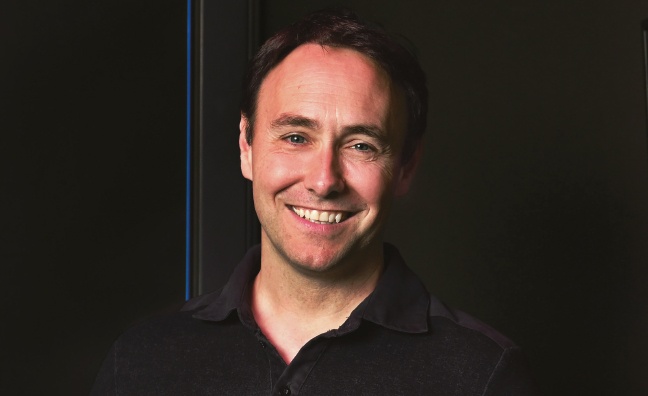BBC Radio 1 head Aled Haydn Jones has put the case forward for why radio’s role in the modern music industry is as vital as ever.
The station was among the big winners for the Beeb in the latest RAJAR radio listening figures, with a year-on-year increase of 5.6% - and an 11.1% uptick on the prior quarter - to more than eight million listeners, as the biggest population increase in 75 years contributed to a record 50.8m people in the UK listening to radio.
Speaking in the current issue of Music Week, Haydn Jones talked through the common misconceptions about the medium, pointing out that three quarters of the 15 to 20-year-olds listen to the radio every week - rising to 80% for people under 35.
"Radio is one of the mediums that, because it doesn’t fight for your attention, it doesn’t lose out when new technology comes in," he said. "Audio is so adaptable. What’s happened is that the number of hours of audio has grown in the last few years. So yes, there is streaming. Yes, people will use YouTube as background noise as much as they would visually. Yes, there probably is Snapchat and TikTok to take your attention.
"But radio endures because of that fear of missing out on the liveness as cultural moments happen, whether that’s Glastonbury or a Taylor Swift or a Billie Eilish album, or even news stories as they happen. They don’t go to streaming to find out what’s going on; over three quarters of young people turn to radio.
"I think that’s probably the most frustrating part of my job, this perception that it’s an old medium rather than a current one. Nothing could be further from the truth.”
We don’t view TikTok doing the job that we do, which is breaking artists
Aled Haydn Jones
Furthermore, Haydn Jones said he stood by his previous comments regarding TikTok not being a direct competitor to Radio 1.
“We don’t view TikTok doing the job that we do, which is breaking artists," he stressed. "If you are a label or an artist that says, ‘I want to make it big and the only route I’m gonna take is TikTok’, you are really playing the luck game there - my goodness, that’s not an art or a science. So I don’t see TikTok as a challenger in that way.
"I do see TikTok, or Facebook or Snapchat or TV or playing football as competitors because it’s about attention and time that we need.”
BBC Radio 1 claimed the Radio Station trophy at this year's Music Week Awards, reclaiming the award which they last took home in 2022 and marking the second time it had took the honours since Haydn Jones took the reins in June 2020.
Haydn Jones said the barometer of success for the youth network always begins with engagement for 15-24s.
"If we focused on 30 and 40-year-olds, then we will lose the young audiences because young audiences have only ever known personalised media from as long as they were alive," he argued. "So the ‘For me’ element for young people is much louder than it is for a 30 or 40-year-old that will dip into Radio 1. The first measurement is the success we’re having with that age group and the fact that we’re the biggest station for young people in the UK means we’re getting that right.”
Recent schedule changes have included the departure of Clara Amfo with Jack Saunders stepping in to the New Music Show evening slot, but Radio 1 has a long history of replacing key talent when they decide to move on. Haydn Jones has come to accept it as a fact of life.
“You learn, whether you’re a presenter or head of station or a production member, that Radio 1 is about new careers, new artists, new presenters, new production," said Haydn Jones. "Take a snapshot of the heavyweights in the music industry and they’ve all come from Radio 1. Once we start saying, ‘Wouldn’t it be nice to keep that person because they’re doing so well?’ Once you start giving into that, Radio 1 will start to falter.
"We have a licence fee there and we have to put it to good use and develop the stars of tomorrow. That is so much a part of what we do that you can’t get hung up on people leaving the station.”
We’ve got more people following us on our YouTube channels than we do listening to the station on a weekly basis, so we are properly multi-platform as a brand
Aled Haydn Jones
The 47-year-old also reflected on how the station had changed under his leadership over the past four years.
“It’s definitely had a new generation of output of presenters," he said. "There’s not been one press release where there’s been an entire schedule change at all, because it’s definitely about evolution. But when you look back at the four years that I’ve been in the job, the station is unrecognisable from what it was before the pandemic, and that’s been an organic natural evolution with different parts of the schedule doing a different job for different audiences.
"I’m very proud of what we’ve done the last few years. We talk about the radio station as being Radio 1 because obviously the name’s in the title, but really Radio 1 is more about being a youth brand that has a huge footprint, whether that’s the UK’s biggest radio station but also the world’s biggest radio station on socials, the world’s biggest radio station on YouTube for our YouTube channels.
"We’ve got more people following us on our YouTube channels than we do listening to the station on a weekly basis, so we are properly multi-platform as a brand.”
Read the full Music Week Interview with Haydn Jones in our September issue – subscribers can access it online here.












